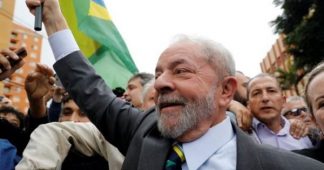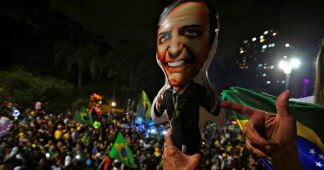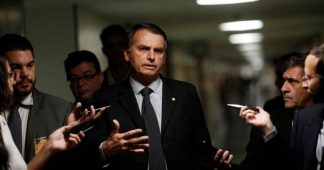September 5, 2021
Former presidents, academics, and world leaders cautioned that on September 7, 2021 “an insurrection will endanger democracy in Brazil”. Among more than 100 signatures, the open letter is supported by the Nobel Peace Prize Adolfo Pérez Esquivel, the American linguist Noam Chomsky, the former president of Ecuador, Rafael Correa, and the former foreign minister of Brazil, Celso Amorim. On Tuesday, Brazilian Independence Day, followers of President Jair Bolsonaro are expected to protest in cities like Brasilia and São Paulo against the judges of the Supreme Court, one of the main targets of the president’s criticism. Bolsonaro himself said days ago that in that convocation “the people” will give “an ultimatum to those who defy the Constitution”.
“Fears of a hit”
“Right now, President Jair Bolsonaro and his allies -including groups of white supremacists, the military police and public officials at all levels of government- are preparing a nationwide march against the Supreme Court and Congress September 7, sharpening fears of a coup in the third largest democracy in the world, “warns the letter that recalls that in recent weeks the far-right president intensified his attacks against democratic institutions.
On August 10, Bolsonaro led an unprecedented military parade through Brasilia and his allies in Congress pushed for radical reforms to the country’s electoral system, considered one of the most trusted in the world. The president threatened several times to cancel the presidential elections of 2022 if Congress does not approve those reforms, an attitude that seems like a choking slap while watching former President Luiz Inácio Lula da Silva rise in the polls.
“Bolsonaro summons his followers to travel to Brasilia on September 7 in an act of intimidation of the country’s democratic institutions,” the document remarks. According to a message shared by the president on August 21, the march will prepare his government for a “necessary backlash” against Congress and the Supreme Court. On that occasion Bolsonaro added that the “communist Constitution” of Brazil took away his power, once again accusing the “judiciary, the left and a whole apparatus of hidden interests” of conspiring against him.
The antecedent with Trump
The letter from world leaders recalls that Brazilian deputies warned that Tuesday’s mobilization “has been modeled after the insurrection in the US capital on January 6, 2021”, when then-President Donald Trump incited his supporters to demonstrate by waving false allegations of voter fraud in the 2020 presidential election.
The document emphasizes its concern about the “imminent threat to democratic institutions” and adds: “The people of Brazil have fought for decades to guarantee democracy against military rule. We must not allow Bolsonaro to take it from them now.”.
During a ceremony in the interior of the state of Bahia, on Friday Bolsonaro reiterated his criticism of “one or two people”, in clear reference to members of the Supreme Court whom he has accused for weeks of “using his power” to try “to give the country another direction.” Although he did not name them, he alluded to the magistrates Alexandre de Moraes and Luis Barroso, with whom he has alienated in the framework of a serious institutional conflict fueled by far-right groups that support the government.
Barroso, in addition to being a member of the Supreme Court, presides over the Superior Electoral Tribunal (TSE) over which Bolsonaro maintains, without proof, that he is preparing a “fraud” for the 2022 elections and that he will use the electronic voting system that the country has for this. adopted in 1996 and whose transparency is widely recognized. De Moraes, for his part, is responsible for a process on the massive dissemination of false news and attacks on democratic institutions through the internet, in which the president himself and dozens of far-right activists are investigated.
Although Bolsonaro insists that the demonstrations on September 7 will be for “freedom” and “conservative values,” some groups that summon them call for a “military intervention” that closes Parliament and the Supreme Court and keeps the ruler in power. The call was rejected by Congress and the Supreme Court itself, and condemned by business organizations, banks, unions, and political parties of the more moderate right, which in recent days have published separate manifestos in defense of democracy and against any kind of “authoritarian adventure”.
The main firms
The harsh proclamation against the coup attempt in Brazil bears the signature of the former presidents of Ecuador Rafael Correa; from Paraguay, Fernando Lugo placeholder image; from Colombia, Ernesto samper and from Spain, Jose Luis Rodriguez Zapatero. The senators of Colombia also accompany Iván Cepeda and Gustavo Petro; and from Argentina Omar Plaini, Marita Perceval, Nora Del Valle Giménez and Nanci Parrilli.
The deputies adhere Eduardo Valdes, Victoria Donda, Fernanda Vallejos, Guillermo Carmona, Eric Calcagno, José Roselli, Monica Macha, Cristina Alvarez Rodríguez, Lia Veronica Caliva, Héctor Fernández, Juan Carlos Alderete and Carolina Yutrovic; from Colombia Maria Jose Pizarro; and from France Jean-Luc Melenchon. For the Parlasur, the vice president signed from Argentina Oscar Laborde and the deputies Gastón Harispe, Julio Sotelo, Cristian Bello, Carlos López, Ricardo Oviedo and Cecilia Britto.
The Greek economist and deputy also expressed their support Yanis Varoufakis; the former ministers of Foreign Affairs of Brazil, Celso Amorim; from Ecuador Guillaume Long and from Chile José Miguel Insulza; the former Argentine ambassador to Venezuela and the United Kingdom Alicia castro.
Likewise, the former presidential candidate and former Minister Coordinator of Knowledge and Human Talent of Ecuador, Andres Arauz; the Secretary General of the Central of Workers of Argentina, Hugo Yasky; and the secretary of International Relations of the Evita Movement, Alejandro Rusconi, among more than 100 signatories.
Published at then24.com
We remind our readers that publication of articles on our site does not mean that we agree with what is written. Our policy is to publish anything which we consider of interest, so as to assist our readers in forming their opinions. Sometimes we even publish articles with which we totally disagree, since we believe it is important for our readers to be informed on as wide a spectrum of views as possible.











